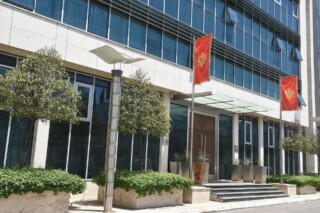The judiciary in Montenegro has never before faced a greater challenge, given the increased pressure of some people in power, as the second-instance court verdict for the coup attempt on the election day (16 October 2016) convicting thirteen people is soon to be made, the Chief Special Prosecutor, Mr Milivoje Katnić, told in an interview with Pobjeda daily.
-Key moments from the interview with Mr Katnić-
It’s the end of the calendar year. How would you describe the results in the fight against organized crime and against how many people did you open up investigation in 2020?
KATNIĆ: The Special State Prosecutor’s Office and the Sector for Fighting Organized Crime and Corruption within the National Police operated in particularly difficult conditions, having in mind the coronavirus pandemic, which is why some special prosecutors and police officers were absent for a significant period of time. However, despite these facts, the results were more than good, even better than last year’s (which were also great).
According to statistical data, from 1 January 2020 to 1 December 2020, the Special State Prosecutor’s Office issued 27 orders for opening up investigations and 6 orders for pursuing investigation against 198 physical persons and 24 legal persons on suspicion of committing criminal offences in the area of organized crime, corruption and war crimes.
Which 2020 cases that fall under the competence of the Special State Prosecutor’s Office you consider particularly important and why is it so?
KATNIĆ: Cases I’ve already mentioned, like every other cases, are extremely important due to their complexity so it’s hard to shortlist them.
The first-instance court verdict for the coup attempt on the election day (16 Oct 2016), when 13 people were convicted of plotting a coup in Montenegro, is now to be reconsidered in the Appellate Court. What are your expectations, given the pressures from people who are now part of the executive and legislative power?
KATNIĆ: I hereby wish to remind you that these pressures are present from the very beginning of the proceedings.
In your opinion, is there a greater challenge now for the judicial power that is soon to make a second-instance decision?
KATNIĆ: In the light of recent social events that are public and transparent, one can see that the judiciary in Montenegro has never before faced such a great challenge. According to the Constitution of Montenegro, a court is an independent body, and rules based on the Constitution, laws and verified and published international treaties.
Following the announcement of Justice and Human Rights Minister, Mr Vladimir Leposavić, that he was going to initiate an amnesty law in case the verdict became final, you wrote a letter to PM, Mr Zdravko Krivokapić, and DPM, Mr Dritan Abazović. Did you receive a response?
KATNIĆ: I wrote to the Prime Minister and Deputy Prime Minister of the Government of Montenegro, not striving to get the answer, but to point out to the damage of behavior of the Minister of Justice and Human Rights, Mr Vladimir Leposavić, especially the immense negative consequences of his announcement that you’ve already mentioned in your question. We’ve already talked about pressures that are obvious, especially on the very Appellate Court and its panel.
This is a strange behavior that doesn’t represent just a pressure on decision makers, but clearly indicates what decision a court should make, and what the ministry, that is, a legislative body – the Parliament of Montenegro – will do in case the first-instance verdict is confirmed.
Synchronized with pressures from Montenegro, judicial bodies of Serbia are also meddling by violating universal legal norms, i.e. by interrogating Mr Mirko Velimirović, who was convicted in Montenegro. Do you think that pressures inside and outside Montenegro come from the same centers of power?
KATNIĆ: I have made it clear several times that the criminal organization which operated ahead of and during the 2016 parliamentary elections in Montenegro, that was formed to commit criminal offences – terrorism – has not been fully detected, and that part of its members remained out of the reach of justice, that this criminal organization continues to operate from the same centers from which it previously operated and certainly with the same goals, one of which was supposed to be realized during the 2016 parliamentary elections.
This structure and structures that back it is still operating, and when it comes to your question and this interview, its operations mainly seek to prevent justice to be reached in the case of the accused in this criminal case.
One of the people found guilty in the coup attempt, now the president of the parliamentary Security Council, Mr Milan Knežević, announced parliamentary hearings and that you were going to be invited. Do you think it’s necessary or it’s just a way of revanchism? What do you have to say to him?
KATNIĆ: To repent.
Are there going to be more “big” cases in the coming period?
KATNIĆ: Whoever committed a criminal offence will face justice.
The new government told that the so-called depolitization of the justice system would include the Special State Prosecutor’s Office as well. What do you think about it?
KATNIĆ: The judiciary and prosecution have been depoliticized for a long time.




